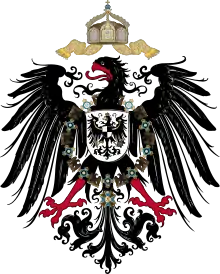Order of Parfaite Amitié
The Order of Parfaite Amitié (German: Orden de Parfaite Amitié; literally meaning "Order of Perfect Friendship") is a dynastic order of knighthood of the Princely House of Thurn and Taxis.
| Order of Parfaite Amitié Orden de Parfaite Amitié | |
|---|---|
| Awarded by | |
| Type | Dynastic Order |
| Royal house | House of Thurn and Taxis |
| Religious affiliation | Roman Catholic |
| Ribbon | Navy Blue and Maroon with a thin Gold border. |
| Motto | VINCULUM AMICITAE (Latin:"Chain of Friendship") |
| Status | Currently constituted |
| Sovereign | Prince Albert II |
| Grades | Knight/Dame Grand Cross Knight/Dame Grand Officer Knight/Dame Commander Knight/Dame Officer Knight/Dame |
Ribbon of the order | |
History
The order was founded during the reign of Alexander Ferdinand, 3rd Prince of Thurn and Taxis as the supreme order of the princely house. Karl Anselm, 4th Prince of Thurn and Taxis then reformed the order and was able to formally transmit it to descendants to this day. With the abolition of the principalities of the Confederation of the Rhine by the acts of 12 July 1806, the order's value became related to the dynasty, and is to be given to members who have turned 18 years of age.
Insignia
The order's medal consists of a golden eight-pointed Maltese cross in white enamel. Within the arms of the cross is located a tower and an upright lion, the symbol from the coat of arms of the House of Thurn and Taxis. In the same arm of the cross are engraved the words VINCULUM AMICITAE (Latin: chain of friendship). In the medallion are the initials CA (Carl Anselm). Marked blue-enamelled medallion with the letters or TW. Since 1928, the initial A (Albert).
Men wear the decoration around their neck with sky-blue band. A copy of the order is in the treasury at the museum at St. Emmeram's Abbey in Regensburg, Germany.
Recipients
- Albert, 8th Prince of Thurn and Taxis
- Albert, 12th Prince of Thurn and Taxis
- Alexander, Margrave of Meissen
- Carlo Alessandro, 3rd Duke of Castel Duino
- Princess Elisabeth of Luxembourg (1901–1950)
- Princess Elisabeth of Thurn and Taxis (1860–1881)
- Franz Joseph, 9th Prince of Thurn and Taxis
- Fritz von Thurn und Taxis
- Prince Gabriel of Thurn and Taxis
- Gloria, Princess of Thurn and Taxis
- Prince Gustav of Thurn and Taxis
- Prince Gustav of Thurn and Taxis (1848–1914)
- Duchess Helene in Bavaria
- Wilhelm Imkamp
- Princess Iniga of Thurn and Taxis
- Princess Isabel Maria of Braganza
- Johannes, 11th Prince of Thurn and Taxis
- Karl August, 10th Prince of Thurn and Taxis
- Princess Louise of Thurn and Taxis
- Prince Ludwig Philipp of Thurn and Taxis
- Archduchess Margarethe Klementine of Austria
- Maria Emanuel, Margrave of Meissen
- Princess Maria Theresia of Thurn and Taxis (born 1980)
- Princess Mathilde Sophie of Oettingen-Oettingen and Oettingen-Spielberg
- Prince Max Emanuel of Thurn and Taxis (b. 1935)
- Prince Max Emanuel of Thurn and Taxis
- Maximilian II of Bavaria
- Maximilian Anton, Hereditary Prince of Thurn and Taxis
- Maximilian Karl, 6th Prince of Thurn and Taxis
- Maximilian Maria, 7th Prince of Thurn and Taxis
- Prince Paul of Thurn and Taxis
- Raimundo, 2nd Duke of Castel Duino
- Alexander, Count of Schönburg-Glauchau
- Elisabeth von Thurn und Taxis
- Baroness Wilhelmine of Dörnberg
References
- Dr. Kurt Gerhard Klietmann: Ordenskunde – Beiträge zur Geschichte der Auszeichnungen Nr. 1, Verlag Die Ordens-Sammlung, Berlin 1958
- J.B. Mehler: Das fürstliche Haus Thurn und Taxis in Regensburg, Habbel-Verlag, Regensburg 1898
